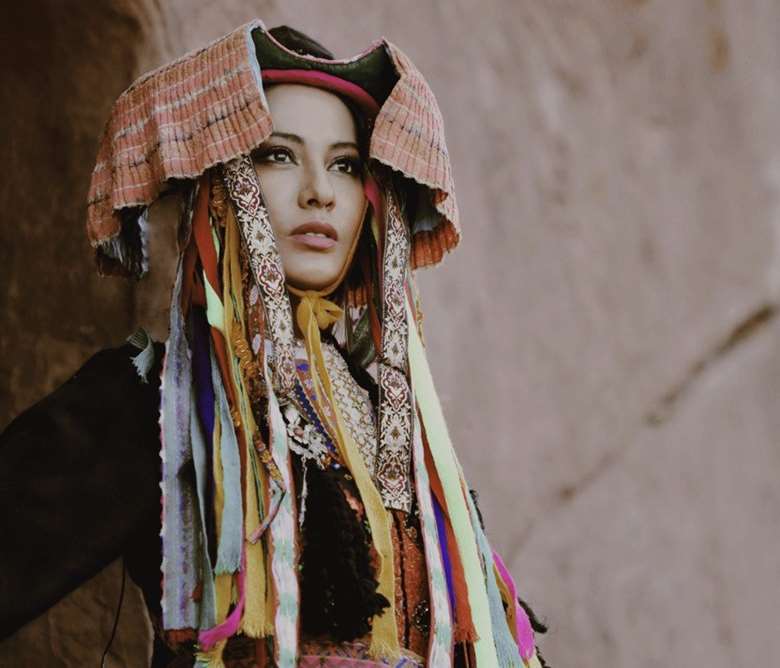Indigenous opera comes to Hoxton Hall
Michael Walling
Wednesday, November 20, 2024
Blending baroque music with ancestral dance, textiles and art, ‘The Mouth of the Gods’ is a celebration of London’s Latin American communities. Border Crossings artistic director Michael Walling explores the process of bringing this recently rediscovered Indigenous opera to the capital

It was back in 2021, in the thick of the pandemic, that Border Crossings first got to know Rafael Montero. He’d sought us out, knowing that we ran the ORIGINS Festival of First Nations, and that I’d also directed quite a bit of opera. It’s a pretty unusual combination, I suppose, but Rafael, as a Quechua and Aymara man from Argentina who is also an operatic tenor, is even more so. And what he shared with us was richer still – a short opera from the 18th century, with music in a blend of baroque and Indigenous styles, written in the Chiquitano language. It had never been performed in England – of course it hadn’t! But my curiosity was aroused.
 Rafael Montero, an Argentinian, Quechua and Aymara tenor, was a driving creative force behind the new production ©John Cobb
Rafael Montero, an Argentinian, Quechua and Aymara tenor, was a driving creative force behind the new production ©John Cobb
Three years later, we’re getting ready to present this beautiful and uplifting piece as part of a performance we’re calling THE MOUTH OF THE GODS. The original opera is a vision of Paradise, full of dances to celebrate a Latin Utopia, but it's only 25 minutes long. We realised that in order to make sense of this piece in a London show, we had to put it into context, so that it became an offer for a better future after the challenges faced by Indigenous people in the past and present. We started to explore the histories of the continent, its astonishingly rich and colourful Indigenous cultures, the stories of their interactions with Europe and the huge variety of textiles, ceramics and musical instruments held in London’s museums. Slowly, we put together a show that combines traditional and modern dances from the region, puppets modelled on figures found in burials, an embroidered mantle from the remote region of Paracas, shamanic practices and children’s choirs. We looked into other music from the region and were astonished by the beauty and vitality of what we found. The combination of all these different art forms allows us to relate stories and histories from across the continent.

 Volunteers have been working on the Paracas mantle for the show under the guidance of Amazonian master embroiderer Bella Lane for over six months (Image courtesy of Border Crossings)
Volunteers have been working on the Paracas mantle for the show under the guidance of Amazonian master embroiderer Bella Lane for over six months (Image courtesy of Border Crossings)
This isn’t something we could have done alone. What we have been able to do is to offer an open and creative space where the artistic work of London’s Latinx communities can be brought together. Some of the people involved are community artists, like the incredibly dedicated team of embroiderers who have been working on the Paracas mantle since March; or the insightful and energetic core dance team, who embody an Indigenous community onstage. Others are established professionals: puppeteers, actors, musicians, choreographers.
It’s by working in deep collaboration over a prolonged period that we’re able to ensure the authenticity and sensitivity of the work. I’m not ‘directing’ in the sense of telling people what to do: an approach which even now, well into the 21st century, seems to be expected in opera houses. My way of working is to assemble people who know much more about the material than I do, and to trust that knowledge. It’s an approach that reflects the need for dialogue and democracy in the intercultural spaces we all now inhabit, based on mutual respect and radical empathy.
 Edith Ramos Guerra brings a deep knowledge of her Indigenous culture to the project, as well as her operatic training ©John Cobb
Edith Ramos Guerra brings a deep knowledge of her Indigenous culture to the project, as well as her operatic training ©John Cobb
It was with this in mind that we made the choice to bring in an international artist from Peru itself to sing the soprano role alongside Rafael. This will be Edith Ramos Guerra, making her first appearance in the UK. Edith is a truly great performer and a cultural ambassador for her people, who combines a deep knowledge of Indigenous Andean music and culture with the operatic skills of baroque performance. For some months we’ve been talking online about the choices of music and the context from which the material emerged. I’m picking her up at Heathrow tomorrow, and can’t wait finally to meet her in person!
The Mouth of the Gods will run from 27 November to 1 December at Hoxton Hall in London. You can find more information at the project website and purchase tickets here.